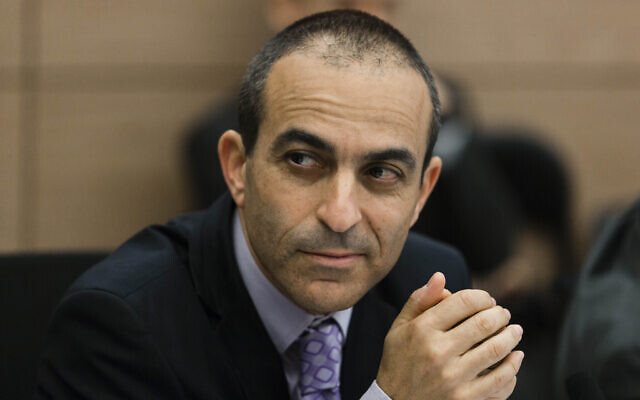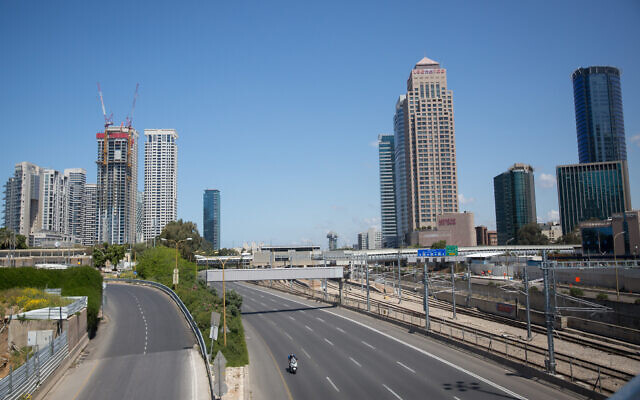Ronni Gamzu says he has no plans for closures over Jewish New Year; hopes for return of flights in two weeks, but says US yeshiva students should not be on them
TOI STAFF

Prof. Roni Gamzu attends a Finance Committee meeting at the Knesset while serving as Health Ministry director general, January 7, 2014. ( Flash90)
The man tasked with steering Israel through the coronavirus crisis said Saturday that he was less concerned about hospitals being overwhelmed with sick patients than with the socioeconomic impact of the pandemic.
Prof. Ronni Gamzu, who was appointed to the job in late July, has expressed strong skepticism about using sweeping lockdown measures to curb the spread of the virus.
On Tuesday, he revealed the broad outline of his plan to deal with the pandemic, which included building up public trust by doing away with what he termed “illogical” restrictions.
“The socioeconomic trauma is much greater” than the health one, Gamzu told Channel 13 Saturday, in one of several interviews aired during the evening.
Mask-wearing Israeli restaurant owners and others protest against lockdown measures in Tel Aviv on July 17, 2020. (JACK GUEZ / AFP)
Gamzu said the possible collapse of the health system due to a surge in COVID-19 patients requiring hospitalization was a concern, but not his main one.
“This is one parameter. The second parameter is definitely the socioeconomic situation. I’m not in favor of only looking at the medical parameter. I must include everything, the Israeli government must include everything,” he told the channel.
Israel imposed a strict lockdown for part of March and much of April, successfully curbing the spread of the virus. After opening the country back up, the country has seen a resurgence of the pandemic. Gamzu’s appointment means that new restrictions or another full lockdown are likely off the table, citing the economic damage.
The empty Ayalon highway in Tel Aviv on April 8, 2020. All intercity travel has been banned until Friday morning. (Miriam Alster/Flash90)
During the pandemic, the unemployment rate skyrocketed to over 25 percent and has yet to fully recover. Small business owners and others say the government has not given them enough help or allowed them to operate normally, causing a rash of closings.
A protester holds a sign depicting Prime Minister Benjamin Netanyahu during a protest a against him outside Prime Minister residence in Jerusalem, Friday, July 31, 2020. (AP/Oded Balilty)
Prime Minister Benjamin Netanyahu, who had been a proponent of stricter restrictions, has lately seen his attempts at imposing new rules stymied by a Knesset oversight panel, which has shot down most proposals to close restaurants, stores, pools and more. Last week the head of the panel said reopening concert venues was on the table as well.
Over the weekend the death toll from the virus shot up to 526, just over two days after reaching 500, according to the Health Ministry. The number of cases has climbed by over 1,000 a day to over 72,000.
According to the figures, 751 patients are currently hospitalized, including 328 people in serious condition, 96 of whom are on ventilators.
Three major hospitals are at over 100 percent capacity in their coronavirus wards, and two more are at 90%, according to the ministry.
However, a Hebrew University report published Thursday asserted that Israel has managed to gain control of the second wave of the coronavirus, thanks to a recent stabilization in the number of seriously and moderately ill patients.

Israel’s newly-appointed coronavirus czar, Prof. Ronni Gamzu, unveils his plan to fight the pandemic, at a press conference on July 28, 2020 (screenshot)
Gamzu told the Kan public broadcaster that Israelis should not anticipate any special closures or restrictions for the upcoming Jewish New Year or other holidays.
“There’s no intention at this moment, or formulated decision at this moment to close for the [fall] holidays,” he said.
He also complained that the public was confused by what he described as inconsistent regulations, specifically citing the fact that beaches are open but indoor shopping malls are closed or restricted.
“It confuses, annoys, angers a public that’s already on the edge,” he said.
Government ministers were expected to roll back the weekend-only closure of stores and malls on Thursday or Friday, but the move was pushed off, leading a number of retailers to open their doors Saturday in violation of the restrictions.
Gamzu on Friday urged retailers to be patient, saying most of their demands were “correct and justified.”
Under current virus regulations, all nonessential stores must close between 5 p.m. Friday and 5 a.m. Sunday as part of a partial measure meant to curb the quickly spreading coronavirus while keeping the economy running for most of the week. Gamzu told Kan that the scheme had “no upsides.”

Israelis shop at the Bilu Center in the central town of Kiryat Ekron on August 1, 2020. (Yossi Aloni/Flash90)
In a separate interview with Channel 12 news, Gamzu expressed support for resuming air travel into Israel by mid-August.
But he also criticized a government decision that could allow some 16,000 yeshiva students from the United States into Israel for the High Holidays.
“We need to do a wise thing here and prevent another conflagration,” Gamzu said.
The US has been harder hit by the coronavirus than anywhere else in the world, with over 4.6 million cases and more than 150,000 deaths. An epidemiological study done during the first wave of the virus showed most of Israel’s infections came from people entering from the US.
The empty arrival hall at Ben Gurion Airport on June 12, 2020. (Olivier Fitoussi/Flash90)
Israel’s borders have been closed to almost all non-nationals since mid March. Under a reported plan being formulated by the Tourism Ministry, the first people allowed back in the country would be students or participants in academic or heritage trips. Soon after, authorities would allow in visitors from other countries, including so-called “green” countries, where tourists would not need to quarantine for 14 days after entering.
“I think the skies will open by mid-August,” he said. “The goal is to allow as many people as possible from ‘green countries,’ because we are plenty red compared to other greens.”







@ Adam Dalgliesh:
Thanks, Adam. I’ve been also thinking about those “overwhelmed medical systems” which somehow never get overwhelmed at the height of regular flu seasons when (at least in the US – see the CDC data) there is a very large number of flu hospitalizations:
https://www.cdc.gov/flu/about/burden/preliminary-in-season-estimates.htm
And 2017-2018 season was MUCH worse and there was no talk of collapse.
“Over the seven-day period which ended August 2nd, a total of 68 coronavirus-related fatalities have been reported in Israel, for an average of 9.71 deaths per day.
That’s more than the previous record of 62 deaths in one week, set during the third week of April, when 62 coronavirus-related fatalities were reported, for an average of 8.86 deaths per day.
Last week, there were 61 coronavirus-related deaths, or an average of 8.71 per day.
That still remains below the fatality rate for the seasonal flu in Israel, which during the 14-week flu season kills on average between 10 to 13 people per day.
There are currently 334 coronavirus patients in serious condition, along with 149 patients in moderate condition. One-hundred patients are currently on assisted breathing.” Note that this is lessthan the weekly death toll from influenza during the hight of a “normal” flu season. The claim that the Israeli medical system can’t cope with this number of patients (about 500 in serious or moderate condition) is absurd. There is terrible mendacity going on.
Thanks, Reader, for your information, which dovetails with both of our conclusions.
@ Adam Dalgliesh:
I found (with some difficulty) that in 2018:
https://www.jewishvirtuallibrary.org/latest-population-statistics-for-israel
in the population of ~8.7 million people.
Suppose, the same or a couple of thousand more people died in 2020.
The total deaths in Israel from COVID-19 until now is 536:
https://en.wikipedia.org/wiki/COVID-19_pandemic_in_Israel
I am not giving the number of cases because this number is totally irrelevant as long as almost everyone recovers or is asymptomatic.
Suppose, the death rate would triple in the absence of any measures and any treatment – this would still mean a 3.3% increase in mortality compared to 2018.
WHO ARE THEY KIDDING CALLING THIS A PANDEMIC AND RUINING THE COUNTRY’S ECONOMY FOR THE NEXT 4 or 5 YEARS AT LEAST?!?!
On the last day for which numbers are avaialble, July 30 of this year, 9 Israelis died of CV-2 while 1,737 recovered. This is a ratio of only slightly more than 1 per cent of recoveries. Even the total reported death toll from the pandemic, 540, is only slightly more than 1 per cent of the total number of “cases,” given as 72,000 plus. There is obviously no need for the Israeli health ministry’s and Netanyahu’s panicky response,
As with other rcountries we don’t know if the “official” figures lump toghether influenza and covid deaths, lists aall deaths as caused by coronavirus if the patient tested positive for coronavirus shortly before he/she died, how many patients had “comorbidities” when they died (such as heart disease or cancer), etc. Several Israeli researchers have complained the the health ministry is keeping most of the statistics it has gathered relating to the CV-2 pandemic secret. That is very suspicious.